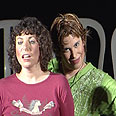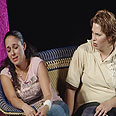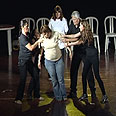


“This is a lot more complicated than coming and saying, ‘I am shell-shocked or I have cancer or my leg was amputated,” said “Enosh” Mental Health Association General-Manager, Dr. Hila Hadas. According to her, these people have an unbelievable amount of courage. “We need to tip our hats to them.”
A community theater group in which actors deal with mental illness, decided to courageously stand on a stage and present skits they wrote and directed themselves, in front of an audience. The segments are all based on their experiences during their illness, hospitalization and rehabilitation.
“They talk about things they felt, things that they may not have been able to say straightforwardly to the people around them,” said Natalie Amragi, a volunteer and participant in one of the performances.
The groups consists of actors from “Teatron Enoshi” ("the human theater"), which has been functioning as part of the “Enosh” association’s Afula branch. Last week was the opening of their play entitled "Voices" at Kibbutz Mizra.
The actors in the group are mostly people contending with mental illness who perform with students and volunteers from the community.
According to them, acting allows them to reveal the private, inner voices of mental illness. These are voices they heard in their heads during their sickness but also the voices expressing the daily difficulties with public image.
The actors talk about the long rehabilitation process and about their hopes to return and integrate in healthy society, which they were just recently apart of.
“The biggest goal, in my estimation, is including the performance in the subsidised culture program of the Education Ministry,” said Hila Hadas at the opening.
“Today you will meet life’s real heroes, and not only those who cope courageously but also their family members who live the disease and cope with it, daily, hourly, paying a domestic, social and monetary price,” said Mira Farbstein, “Enosh’s” Afula branch director.
“Today you will meet society’s walls which don’t always open their gates, today you will meet the caretakers who are also helpless at times. But, alongside the painful lucidity, you will discover the strong belief in the message of hope.”
“When they get on stage, you will not know which actors suffer from mental illness and which are volunteers. This unique mix is essentially our message to you, people contending with mental illness are part of the society, and they can integrate in society just like all other people.”















